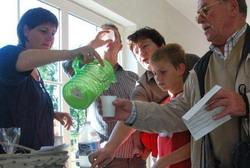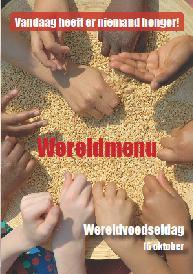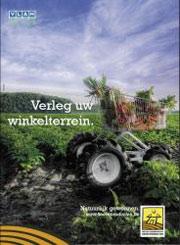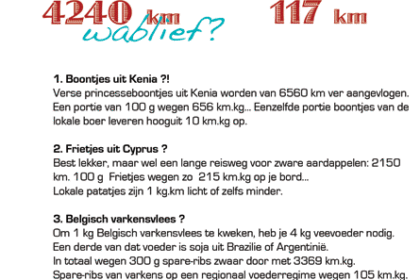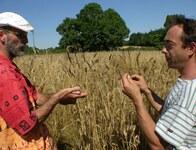Zie voor details rond het Afrikaanse voorstel op deze Wervel website onder thema’s, en dan onder WTO:
13.02.06 Afrika-voorstel in de WTO rond grondstoffen :
http://www.wervel.be/content/view/530/237/
African call for supply management
Please find below a declaration in support of the African Group’s proposal at the WTO about trade in agricultural commodities. It is distributed on behalf of Oxfam-Magasins du monde, Friends of the Earth
Europe and Euroban.
Please sign it on behalf of your organisation, or in a personal capacity, and circulate it as widely as you can. In order to add your signature, or for further information, write to Thomas Lines
(tlines@globalnet.co.uk) or Stéphane Parmentier
(s.parmentier@scarlet.be).
Signatures will remain open until December 20th, 2006.
Sincerely,
Tom Lines, Convenor
International Supply Management Working Group of the
Agribusiness Accountability Initiative
Dec 5, 2006
Call for Action on the Crisis in Agricultural Commodities
Common position in support of the African Group proposal submitted to the WTO Agriculture Committee on June 7th 2006
The signatories of this common position are united in their concern about the serious crisis facing commodity-dependent developing countries.
Unstable and non-remunerative prices
Internationally, agricultural commodity prices are permanently unstable and in long-term decline. For example, between 1980 and 2005, world sugar, cotton-fibre, coffee and cocoa prices fell by 25%, 32%, 44% and 47% respectively. After taking inflation into account, the price falls over that period were between 69% and 78%.
This has done lasting damage to the economies of poor countries which depend on these goods for their export incomes, constraining the governments’ efforts to provide the most basic public services and
combat poverty. Low and unstable prices have led to substantially lower incomes for their farmers and pressure on wages for their food workers.
Structural oversupplies on world markets, induced by donor agencies’ insistence on policies of export orientation, form a large part of the reason for this crisis.
Supply Management
World agricultural markets offer no mechanism to guarantee stable and remunerative prices. On the contrary, on most markets price instability arises from the unresponsiveness of both supply and demand to changes in price. This is an inherent feature of these markets and only non-market mechanisms can correct it. However, market liberalisation has deprived public authorities of the policy tools required. In particular, instruments that enable them to manage supplies have been abandoned in many national and regional markets and are no longer even discussed at international level.
However, many close observers of the situation now share the same analysis: production quotas, export restrictions and taxes, buffer stocks, import quotas and duties and other supply management techniques are important tools that should remain available for States to regulate agricultural prices and trade.
Tariff Escalation
If poor countries were in a position to reduce their dependence on commodity exports, their economies would be less vulnerable. However, their efforts to develop agro-processing and reduce dependence on commodity markets are undermined by the "escalating" tariffs imposed by importing countries, which place higher tariffs on processed products than on raw materials. The barriers that prevent the processed products of developing countries from entering many developed countries’ markets remain significant, especially for the poorest countries.
The response of the African group at the WTO
Africa’s governments have launched various initiatives in recent years to tackle these problems in the framework of international trade negotiations. The most important was the most recent: the 41-country African Group’s Communication to the Committee on Agriculture at the World Trade Organisation on 7 June 2006. This Communication (no. TN/AG/GEN/18) made four main proposals concerning agricultural commodities:
• Reductions in the levels of tariff escalation, to be achieved by negotiations between countries.
• A legal instrument clarifying WTO rules to authorise joint actions by producing countries, alone or with consuming countries, with a view to attaining stable, fair and remunerative prices. Such arrangements could be negotiated by the producing countries themselves or adopted after negotiations at UNCTAD or the International Commodity Organisations. They could entail the control of overproduction or restrictions on exports.
• Technical and financial assistance for the implementation of these arrangements, from relevant organisations including UNCTAD, the International Commodity Organisations, the World Bank, the IMF and perhaps the WTO. One requirement would be to compensate farmers for losses of income in the period immediately after the adoption of supply management systems.
The Communication also called for procedures to negotiate the elimination of non-tariff measures that harm developing countries’ export trade in commodities.
The signatories of this common position consider that the African Group’s proposal of 7th June 2006 is a serious attempt to help resolve the problems described above. As such, it offers a major opportunity which should be seized as soon as negotiations on agriculture under the Doha Round resume.
In the light of the above, the signatories:
– strongly support the African Group’s proposal of 7th June 2006 at the WTO Committee on Agriculture;
– invite all WTO Member States to do likewise;
– call for the policies outlined to be firmly supported and pursued through all relevant channels, whatever may be the future status and outcome of the negotiations at the World Trade Organisation.
This common position was issued on the initiative of Oxfam-Magasins du monde, Friends of the Earth Europe and Euroban, and is supported by the following organisations:
Organisation’s name representative country
……. ……. …….
The following individuals support this common position:
Name country
……. …….

